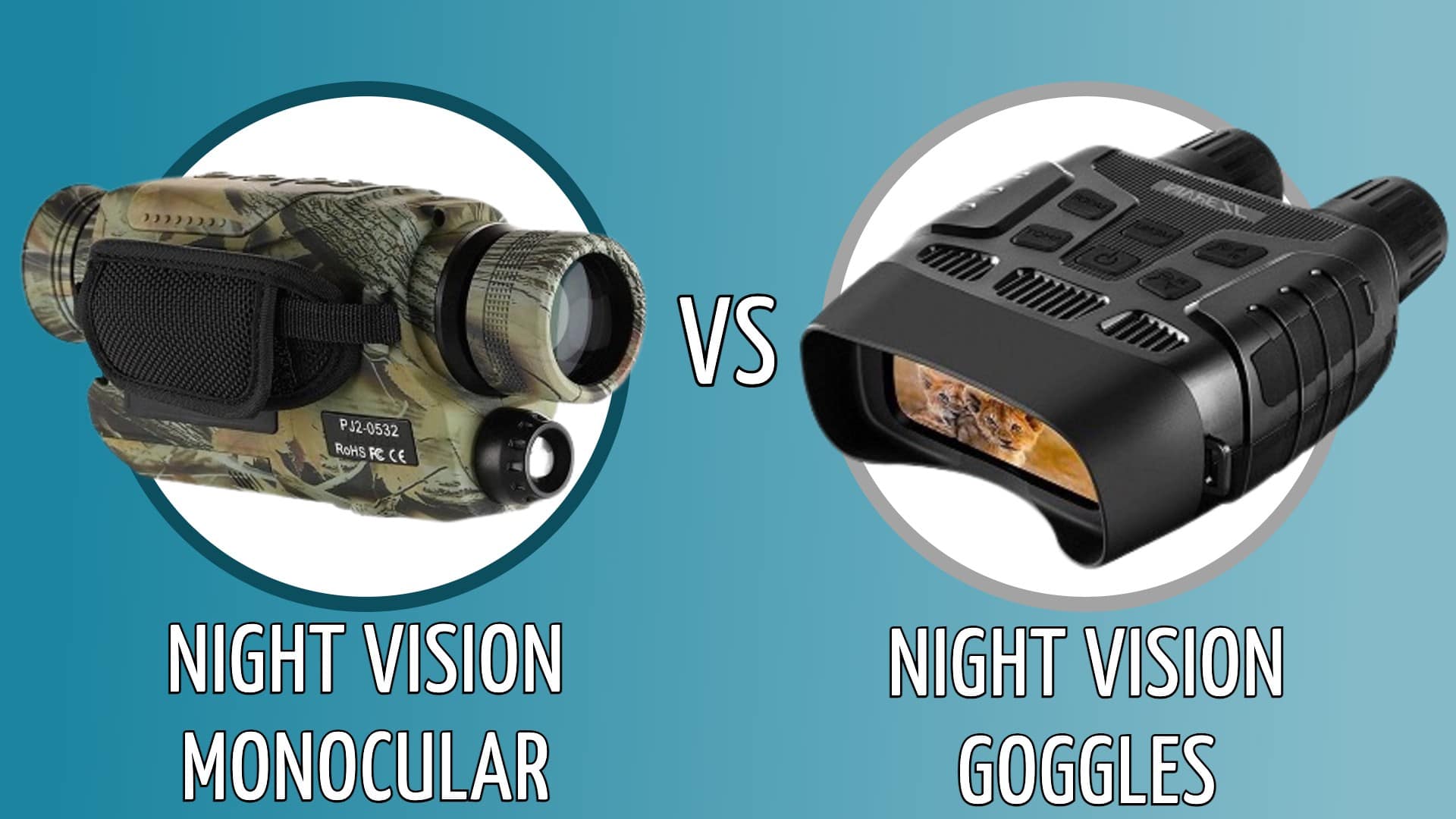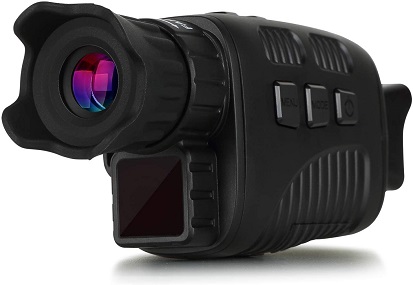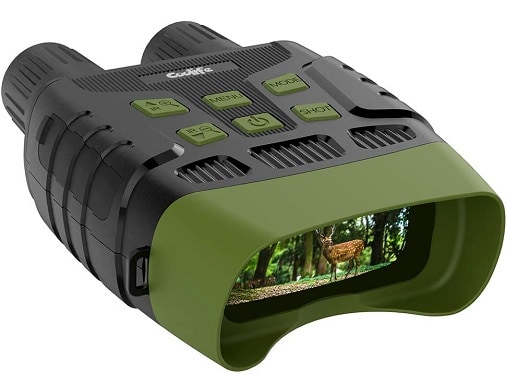Night Vision Monocular vs Goggles: Which is Better?
Last Updated on

It’s an exciting day when your night vision equipment first arrives. You slap them on and introduce yourself to a whole new world. But getting to that point can become increasingly frustrating as you get bombarded with questions that you’re not sure how to answer.
Whether you’re trying to figure out which generation night vision you need or still trying to figure out how and where you can use them, it can all be more than a little overwhelming.
But before you dive too deep into the woods, you need to decide if you want a monocular or goggles. Don’t worry, we’ll walk you through everything you need to know to make the decision easy for you!

Overview of Night Vision Monoculars
A night vision monocular is a device that only fits over one eye. Because they are a single scope, they are an extremely versatile option that you can use in a wide array of situations.
There are multiple night vision monocular styles, and some of the significant differences come down to how they mount and if they have magnification features. These features vary in their effectiveness in specific situations.

In addition to their versatility, one of the biggest perks of night vision monoculars is their size. They are usually extremely small and lightweight and can fit into something as tiny as a shirt pocket.
When You Want A Night Vision Monocular
Because night vision monoculars are so versatile, there are tons of different situations you might want one. If you’re looking to take pictures with night vision, you’ll want a monocular, just as you’ll need one if you plan to attach it to your rifle scope.
Another time night vision monoculars stand out is when you’re hiking trails. Night vision monoculars give you the ability to maintain your adapted night vision in your unaided eye.
Moreover, the unaided eye maintains much of its peripheral vision, which helps you navigate tough terrain and track movement while hunting.
How Do You Use A Night Vision Monocular?
Despite the single scope, you need to keep both eyes open when using a night vision monocular. This might feel a bit unnatural at first, but the longer you use them, the more natural it will feel.
The result of keeping both eyes open is that you’ll have “split vision,” where one eye sees in night vision, and the other doesn’t. That might seem like a hindrance at first, but it’s actually an advantage.
You’ll keep your night-adapted vision in the unaided eye, and you’ll keep most of your peripheral vision as well. This will help keep you from tripping over uneven terrain and let you maintain some sort of depth perception. However, night vision monoculars do not offer near the amount of depth perception that night vision goggles provide.
- They are extremely versatile
- You can mount them to rifles and cameras depending on the generation
- They are small and light
- You can preserve night-adapted vision and some peripheral vision in your unaided eye
- You must keep both eyes open and adapt to “split” vision
- They provide limited depth perception
Overview of Night Vision Goggles
Night vision goggles are what most people think about when they think of navigating in the dark. They’re typically head-mounted, and they come with two eyepieces to completely cover your vision.
This dual eyepiece setup makes them perfect for beginners and those that need excellent depth perception at night.

When You Want Night Vision Goggles
Night vision goggles are great when you can’t sacrifice your depth perception. Whether you’re navigating a boat or truck in the dark, or you’re just trying to keep your footing on a tricky trail, the last thing you want is to be guessing how far away something is.
The tradeoff is their size and weight. Night vision goggles are significantly heavier and bulkier than monoculars, so if you’re heading out for a longer trek, you might find that the added weight is a significant drawback.
Single Tube Googles Vs. Dual Tube Goggles
When you’re looking at night vision goggles, there are two different types that you can choose from. Single tube goggles combine the images from both eyepieces into a single image. These goggles provide an image that is similar to your regular vision.
From there, they offer dual tube goggles. Instead of combining the images from each eyepiece into a single image, you see each image separately. This might seem like a hindrance, but in fact, it gives you better depth perception, which can be a lifesaver when you’re navigating.
While dual tube goggles can take a bit more getting used to than single tube goggles, both are an easier transition compared to monoculars.
- They provide better depth perception than monoculars
- Single tube goggles are great for beginners
- Dual tube goggles provide unparalleled depth perception
- Easy to get used to and don’t have a learning curve
- They can easily be head-mounted
- Night vision goggles weigh more than night vision monoculars
- Night vision goggles cannot be mounted to rifles and have limited camera adapters

Do You Want or Need Magnification?
If you want magnification on your night vision, that’s alright, but you want to be able to adjust it. While this is typically the case with most higher-end equipment, some of the cheap stuff always has a 2x magnification or higher.

While this might sound cool at first, as soon as you go to use them, you’ll realize your mistake. Staying on the trail and keeping your balance is near impossible with magnified night vision. To add insult to injury, magnified night vision is only useful in a limited number of situations.
For instance, if you’re camping out a location for a raid the next day, a magnified night vision setup is fantastic. But if you’re running those raids in the military, they’re giving you what you need.
On the civilian side, it’s more of a novelty to try and see what’s going on 200+ yards away. How often do you need to do that?
Night Vision Monocular vs Goggles – Which is Right for You?
While you might be looking for a more direct answer to which is better, night vision goggles or monoculars, the answer isn’t that simple. That’s because what might be better in one situation might be terrible in another.
Don’t worry, we broke down some of the most common scenarios in which you might need night vision below.
Do You Want Night Vision Goggles or Monoculars for Hunting?
When you’re hunting, the answer is easy – go with the monoculars. You can mount monoculars to your scope and have night vision while you’re bearing down the sights. With goggles, you won’t be able to aim – which is a bit of a problem if you’re hunting.
Do You Want Night Vision Goggles or Monoculars for Hiking?
This is probably the most complicated answer. That’s because while goggles provide better depth perception, which can make your hike a bit easier, they’re also significantly heavier.
So, it comes down to two factors. First, how long is your trek? The reason it matters plays right into the second factor, how in shape are you, and how long can you handle the added weight on your head?
If you don’t mind the added weight or you’re only going short distances, the goggles are better. But, if you don’t want to deal with the extra weight or you’re going on extra-long hikes, ditch the extra weight and get used to the monocular.

Do You Want Night Vision Goggles or Monoculars for Boating/Driving?
First, stay off public roadways when using night vision. While it can be fun to test them out while you’re driving, it’s not the safest thing in the world. However, if your boat doesn’t have a headlight, it might be precisely what you need.
As far as which one you need, goggles are better for either boating or driving. They give you extra depth perception, and that’s a critical factor anytime you’re operating a heavy piece of machinery.
Just make sure to take it slow. While you might get better depth perception, it’s still not great.
Are Night Vision Goggles or Monoculars More Affordable?
While there are plenty of expensive and affordable options for both night vision goggles and monoculars, goggles tend to be a bit more expensive.
It’s not hard to see why. They’re bigger, and they offer twice the equipment. In the end, don’t let the price force you into something you don’t want, though. Instead, save up your money for what you actually need so you’re not stuck with equipment that you’re not satisfied with and doesn’t get the job done!

Conclusion
Both night vision goggles and monoculars are excellent choices for different applications. While there’s no cookie-cutter choice for everyone, there are definitely situations that call for one or the other.
But with just a little bit of research and planning, you can find exactly what you need to take your setup to the next level. Strap on your night vision and start exploring the world after the sun sets!
See also:
About the Author Robert Sparks
Robert’s obsession with all things optical started early in life, when his optician father would bring home prototypes for Robert to play with. Nowadays, Robert is dedicated to helping others find the right optics for their needs. His hobbies include astronomy, astrophysics, and model building. Originally from Newark, NJ, he resides in Santa Fe, New Mexico, where the nighttime skies are filled with glittering stars.
Related Articles:
Monocular vs Telescope: Differences Explained (With Pictures)
How to Clean a Refractor Telescope: Step-by-Step Guide
How to Clean a Telescope Eyepiece: Step-by-Step Guide
How to Clean a Rifle Scope: 8 Expert Tips
What Is a Monocular Used For? 8 Common Functions
How to Clean a Telescope Mirror: 8 Expert Tips
Brightfield vs Phase Contrast Microscopy: The Differences Explained
SkyCamHD Drone Review: Pros, Cons, FAQ, & Verdict

